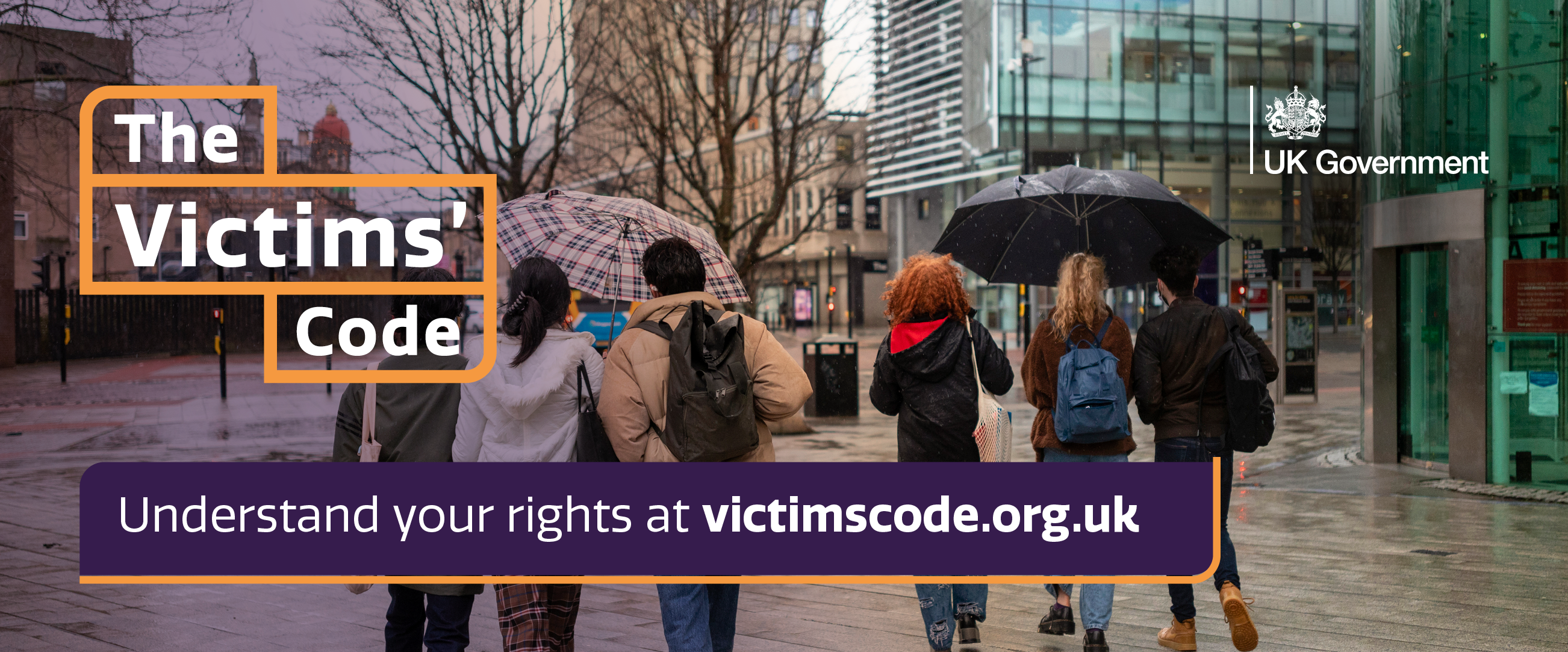Your rights as a victim of crime


The Victims’ Code explains the rights that everyone can expect to receive as a victim of crime.
Whoever you are and whatever the crime, you have the right to be informed about the criminal justice process and the support available.
Criminal justice agencies are responsible for making sure that victims receive the rights in the Victims’ Code. You can expect them to tell you about your rights as you go through the criminal justice process.
The criminal justice agencies include:
- The police
- Crown Prosecution Service (CPS)
- HM Courts and Tribunals Service (HMCTS)
- Youth Offending Teams
- HM Prison and Probation Service (HMPPS)
- British Transport Police (BTP)
If you decide not to report the crime, you’re still able to get help and hear about the Victims’ Code from support services.

What are my rights under the Victims’ Code?
Alternative translations and accessible versions of the Victims’ Code can be found here.
Right 1: To be able to understand and to be understood
You have the right to understand the information you’re given and to be understood. This includes access to translation or interpretation services if needed.
Right 2: To have the details of the crime recorded without unjustified delay
You have the right to have the crime recorded by the police promptly and may be able to get extra support from a specialist if you need help communicating. Find out more about reporting a crime.
Right 3: To be provided with information when reporting the crime
You have the right to receive written confirmation that the crime has been recorded, get information on the criminal justice process, and be told about support services.
Right 4: To be referred to services that support victims and have services and support tailored to your needs
You have the right to be referred to support services or contact them directly. You should also be told about any extra support at court which is available to you. Find out more about the support available.
Right 5: To be provided with information about compensation
You have the right to be told about compensation that may be available for any loss, damage or injury caused by a crime. Find out more about claiming compensation.
Right 6: To be provided with information about the investigation and prosecution
You have the right to be given updates on your case, be told about important decisions and ask for a review of certain decisions.
Right 7: To make a Victim Personal Statement
You have the right to make a statement telling the court how the crime has affected you, which will be considered when sentencing the offender.
Right 8: To be given information about the trial, trial process and your role as a witness
You have the right to be told the date, location and outcome of any hearing. If you need to give evidence, you can get help before, during and after the trial. Find out more about the court process.
Right 9: To be given information about the outcome of the case and any appeals
You have the right to be told the outcome of the case and the sentence. If the offender appeals, you should be told the outcome.
Right 10: To be paid expenses and have property returned
You have the right to claim expenses from giving evidence in court. If property was taken as evidence, you should get it back promptly.
Right 11: To be given information about the offender following a conviction
You have the right to join the Victim Contact Scheme if eligible. The scheme gives you updates on the offender’s sentence, including when they’re being considered for release.
Right 12: To make a complaint about your rights not being met
You have the right to complain to the relevant organisation if you’re unhappy with how you’ve been treated. Find out more about making a complaint.
Different versions are available to help victims understand their rights:
- a Welsh translation of the Victims’ Code
- a Victims’ Code leaflet for young victims of crime
- an easy-read version of the Victims’ Code
- a large print version of the Victims’ Code
- a BSL translation of the Victims’ Code
- additional translations of the Victims’ Code

Where can I find support?
• Find local support services across England and Wales.
• Get support online or over the phone.
Can I get more support as a victim of crime?
If you’re under 18 years of age, considered vulnerable, have been intimidated or repeatedly and deliberately targeted, or are the victim of a serious crime, you may be eligible for enhanced rights. These include being referred to a specialist support service, being updated sooner after key decisions and getting extra support to give evidence in court. Find out more about enhanced rights.
References to ‘rights’ on this site mean the services that should be provided to victims of crime under the Victims’ Code.